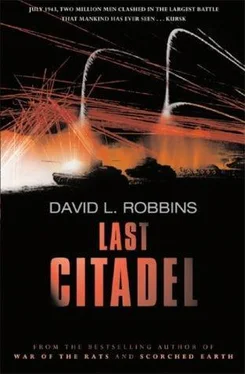The mission for Leibstandarte was a simple one: Lead the charge to Prokhorovka, and crush everything in the way. Totenkopf was already encountering running battles in and out of the small farm villages and river lowlands. In another fifteen minutes when the full attack started, Das Reich would have to charge ahead on the other side of the road and rail line, through scattered forests and rolling knolls where the Reds could duck and counter-punch. Leibstandarte in the middle stared across a mostly level plain where visibility would be exceptional, where enemies would face little but each other. Luis thought of a bullring, where nothing separated the combatants but their wills to kill and survive. He fingered the hilt of the SS knife at his belt. He searched again for the partisan’s pulse in his hand and found it. He turned to the turret, to the raised hatch cover for the mark of Erich Thoma and found it, too, brown and flaking, no longer blood but like the partisan, a memory of blood.
The fourteen tanks of his company began to jerk forward, firming into their wedges and positions around him, dustless over the damp earth. His own driver waited for his command. The long poles in the faraway map room waited, too. The sunflowers in the gray distance beyond Komsomolets farm called to him. Luis had always liked sunflowers, a very Spanish bloom, evoking long hot days and idleness.
‘ He llegado ,’ he spoke to the Red fighters, the angry host standing hard between him and the sunflowers’ gold. I have come . I have come for the honor of the Blue Division. I have come for my father and for Spain. I have come for the lost parts of me. Soy la Daga .
The first seconds of the assault stunned him. Cropland and grasses as far as Luis could see, which had been swaying in the dreary wind moments before, now rose together and advanced. Twenty thousand men and weapons, three hundred revving tanks and assault guns, all stirred at once, as though the plates of the earth had shifted; the ground itself seemed to slide forward. The gray-clad grenadier regiments of the three SS divisions put their guns in their hands and their boots into the soil and river and stomped east, over the tracks, across the florid flat steppe. Then came the first flights of air cover. The Luftwaffe’s Henschel 129s droned in slow and wicked, searching for targets in the fields and villages ahead, and above them the sirens of the diving Stukas began to whine in powered dives. There was inconceivable German power concentrated here. The world tilted east at the Russians and Luis urged his Tiger to join the rolling crest. He wondered what the Reds could do to stop them. He unwrapped a packet of crackers and chewed, almost too excited to swallow; he had to guzzle from his canteen to get the crackers down.
The first answering cannonade whistled in from across the Psel. Damn Totenkopf , Luis thought again, they can’t even keep the Reds busy enough in their own sector to stop them from firing at us south of the river. The rounds landed wildly among his panzers, striking nothing but damp ground and flinging muddy clumps. Luis did not batten down his hatch. He kept his eyes on the dark ten thousands walking and riding around him into the Russian defenders of Komsomolets. He was not impatient or jealous that these others came along, too. He was not afraid he would die today. He laid his hands on the quivering, creeping Tiger. Men and machines kept pace around the tank, believing in this machine as a salvation. Balthasar and the hidden crew waited for his order, and then whoever he chose would die instead of him.
In the next second a hundred reasons for doubting the magic of his life tore through the sky from the north. Like locusts came a screeching mass of rockets, Katyushas, the feared Stalin organs. The missiles rode on comet tails against the charcoal daylight and ripped into the Leibstandarte lines. The explosions pounded on the earth in fantastic rhythm, one boom scarcely separated from the next. The rockets pelted with the speed of a wild heartbeat, and the panzergrenadiers could leap neither left nor right under them but only fall to their bellies where they were and cover their ears. Luis ordered the driver to stop under the hail, soldiers were sprawled in the Tiger’s path. He ducked in the hatch, listening to the Valkyrie screams of the rockets. A few eruptions came close to his Tiger. The Katyushas were not precision weapons. They were designed to sow havoc and fear, but they could kill what they hit. He stayed low in the fuselage until the last rocket fell. His loader cast him a bemused grin across the giant breech.
‘Raining, Captain?’
Luis felt no friendship for these men in his crew. They were his tools. But he’d never been one to let his banderillas grow dull or rusty, the spikes were sharpened before every corrida . He smiled for the loader although he did not try to remember the boy’s name.
‘I don’t think they make umbrellas for this kind of rain.’
The loader chuckled, making a show of approval for the remark. That was witty, Luis thought, I made a funny comment. He was pleased with his show of humor, something he used to have in his command of men when he was the Spaniard.
He stood. The Soviet rockets had shot their bolt and the grenadiers were on their feet and moving again. Luis ordered the driver forward. The plain was not cratered much by the Katyushas, the missiles were more frightening than effective. Only one soldier did not rise to join the advance. Luis rode past the body and felt nothing. This wasn’t the time to take stock of his remaining humanity. The Tiger lumbered forward, men walking beside him and standing in other turrets looked up at him; the last thing they wanted from this Tiger tank’s commander right now was introspection.
A Henschel ground-attack plane drove low across his regiment’s line. The pilot tossed out a purple smoke grenade. The canister hit the ground and raised an oily, pastel stink. Luis curled his nostrils and focused on where he was. The signal meant one thing. Tanks.
He hoisted his field glasses toward Komsomolets, five kilometers ahead now. The clot of structures was a state farm; several grain silos and claret-painted outbuildings were clustered beside the Prokhorovka road and rail mound. A swarm of T-34s raced out from behind cover. He estimated a hundred Soviet tanks burst across the fields, fanning to the left in a flanking action. Sturmovik fighters scorched out behind them. The Luftwaffe planes powered into this Red air cover and they struck up their customary tangled dances overhead. The SS tanks halted. Luis picked his first dashing targets through the binoculars while the Russians were still at the disadvantage of distance. By the time the Reds came close enough to become worrisome, he was certain Balthasar would have a half dozen of them in bits.
Balthasar spoke in the intercom, he had a target. Luis gave him permission to fire. The tank bucked around Luis when the cannon let go. The other three Tigers in the panzer regiment bayed at almost the same moment. In the following seconds, two dozen assault guns and self-propelled tank destroyers joined in. Two kilometers away, the first towers of smoke and steppe drifted into the air among the charging Red tanks. Luis stood in the turret, bracing himself against every blast from Balthasar’s long barrel, wiping his goggles after each of the gunner’s shots. Balthasar and his loader worked as fast as Luis could give them instructions. Their readiness with another shell and firing solution flowed in tempo with the battle beginning to swirl in the fields. Luis held on tight and between rounds ordered the Tiger forward in careful steps, to keep up with the running grenadiers but not to shorten the distance to the rushing T-34s any quicker than he had to. When Balthasar had a target acquired, Luis stopped to let him fire, put his hands over his helmeted ears, then crept ahead in pace with the infantry. The radio operator transmitted Luis’s commands to the rest of the company, for his platoon to stay in wedge formation around his Tiger, and for the other three platoons of Mark IVs to swing into an echelon left position to protect the flank from T-34s coming in wide from the north. More artillery cascaded in from across the Psel, and another barrage of Katyushas stymied the advance for a minute, driving Luis back inside the Tiger, drawing more mirth from his sweaty crew.
Читать дальше












